5 aug 2015
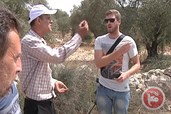
Dozens of Palestinian residents of the West Bank village of Kafr Qaddum staged a sit-in on Wednesday to protest the Israeli national water company cutting off its supply to the village, locals said.Hamzeh Jumaa, the head of the village council, told Ma'an that the Israeli water company Mekorot cut off its supply on Sunday.
He said that the water supplies some 4,000 people living in Kafr Qaddum in Nablus, which he highlighted was an agricultural village. He said that thousands of poultry birds had died due to a lack of water combined with extreme temperatures.
Jumaa said that they have not received any answer from Mekerot as to why the water was cut off or when it will be brought back.
The council head added that Mekerot provides water to all Palestinian villages and illegal Israeli settlements in the surrounding area. Israelis, including settlers, have access to 300 liters of water per day, according to EWASH, while the West Bank average is around 70 liters, below the World Health Organization's recommended minimum of 100 liters per day for basic sanitation, hygiene and drinking.
Kafr Qaddum has lost large swathes of its land to Israeli settlements, outposts and the separation wall, all illegal under international law.
According to the Applied Research Institute of Jerusalem, more than 10 percent of the village's land has been confiscated for the establishment of the settlements alone -- Kedumim, Kedumim Zefon, Jit, and Givat HaMerkaziz.Residents of Kafr Qaddum stage regular protests, including a weekly Friday march, to protest land confiscations as well as the closure of the village's southern road by Israeli forces.
The road, which has been closed 13 years, is the main route to the nearby city of Nablus, the nearest economic center.Israeli forces regularly use violent means to suppress the protests.
He said that the water supplies some 4,000 people living in Kafr Qaddum in Nablus, which he highlighted was an agricultural village. He said that thousands of poultry birds had died due to a lack of water combined with extreme temperatures.
Jumaa said that they have not received any answer from Mekerot as to why the water was cut off or when it will be brought back.
The council head added that Mekerot provides water to all Palestinian villages and illegal Israeli settlements in the surrounding area. Israelis, including settlers, have access to 300 liters of water per day, according to EWASH, while the West Bank average is around 70 liters, below the World Health Organization's recommended minimum of 100 liters per day for basic sanitation, hygiene and drinking.
Kafr Qaddum has lost large swathes of its land to Israeli settlements, outposts and the separation wall, all illegal under international law.
According to the Applied Research Institute of Jerusalem, more than 10 percent of the village's land has been confiscated for the establishment of the settlements alone -- Kedumim, Kedumim Zefon, Jit, and Givat HaMerkaziz.Residents of Kafr Qaddum stage regular protests, including a weekly Friday march, to protest land confiscations as well as the closure of the village's southern road by Israeli forces.
The road, which has been closed 13 years, is the main route to the nearby city of Nablus, the nearest economic center.Israeli forces regularly use violent means to suppress the protests.
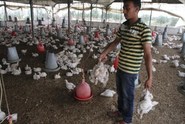
Heavy losses were suffered by the poultry farming sector in the West Bank due to the heat wave which is currently hitting the region amid fears that the Ministry of Agriculture will not compensate the farmers under pretext of lack of adequate finances.
According to the news from the West Bank governorates many broiler chickens, turkeys, and laying hens died and some greenhouses exploded because of the scorching heat.
Many fires burst out affecting hundreds of trees and irrigated crops were damaged which may lead to an increase in the prices of some vegetables and fruits.
Palestinian farmers are asking for an immediate compensation before the Israeli occupation exploits the situation and smuggles products from the settlements and the 1948 occupied lands' markets in order to compensate for the shortage of various products in the Palestinian market.
According to the Palestinian Ministry of Agriculture, the poultry farms’ losses have been estimated at more than 160 thousand shekels so far and are expected to increase.
Increasing losses
Mahmoud Salha, an agricultural engineer from Nablus, said that the farmers are not prepared for such unexpected high temperatures, which indicates neglect on the part of the concerned authorities who are responsible for guiding and aiding the farmers in such circumstances.
Many Palestinian farmers are complaining about flooding the Palestinian domestic market with Israeli agricultural and animal products, and that the Palestinian farmers are not being compensated unlike the Israeli farmers in the settlements who are being immediately compensated for any losses.
"The situation is dangerous, the losses are increasing and the Ministry of Agriculture hasn't compensated the farmers so far, the needed procedures must be taken to avoid any further loss and damage," Samir al-Masri, a farmer from Tulkarem, said.
Several West Bank areas have recently witnessed unprecedented high temperatures causing huge losses to farmers in the poultry sector.
The farmers haven't completely abided by the warnings, advice, and guidance of the agricultural engineers and the veterinarians concerning the dangerous impact of the high temperatures on the poultry sector.
According to the news from the West Bank governorates many broiler chickens, turkeys, and laying hens died and some greenhouses exploded because of the scorching heat.
Many fires burst out affecting hundreds of trees and irrigated crops were damaged which may lead to an increase in the prices of some vegetables and fruits.
Palestinian farmers are asking for an immediate compensation before the Israeli occupation exploits the situation and smuggles products from the settlements and the 1948 occupied lands' markets in order to compensate for the shortage of various products in the Palestinian market.
According to the Palestinian Ministry of Agriculture, the poultry farms’ losses have been estimated at more than 160 thousand shekels so far and are expected to increase.
Increasing losses
Mahmoud Salha, an agricultural engineer from Nablus, said that the farmers are not prepared for such unexpected high temperatures, which indicates neglect on the part of the concerned authorities who are responsible for guiding and aiding the farmers in such circumstances.
Many Palestinian farmers are complaining about flooding the Palestinian domestic market with Israeli agricultural and animal products, and that the Palestinian farmers are not being compensated unlike the Israeli farmers in the settlements who are being immediately compensated for any losses.
"The situation is dangerous, the losses are increasing and the Ministry of Agriculture hasn't compensated the farmers so far, the needed procedures must be taken to avoid any further loss and damage," Samir al-Masri, a farmer from Tulkarem, said.
Several West Bank areas have recently witnessed unprecedented high temperatures causing huge losses to farmers in the poultry sector.
The farmers haven't completely abided by the warnings, advice, and guidance of the agricultural engineers and the veterinarians concerning the dangerous impact of the high temperatures on the poultry sector.

Dozens of Palestinians late Tuesday staged a sit-in outside the electricity company headquarters in Rafah protesting against the unscheduled and long power outages in the city.
The participants carried banners and chanted slogans calling for an urgent solution to the power crisis in the city.
Palestinian police forces deployed in large numbers in the vicinity of the electricity company to prevent any possible riot.
Rafah city in the southern Gaza Strip was left in darkness after the main Egyptian grid that supplies the city with electricity malfunctioned.
The Gaza electricity company said earlier Monday that the unscheduled power cut across the entire southern areas of the Gaza Strip was due to a malfunction in the Egyptian power grid.
Due to the sudden malfunction, Gaza supply lines became far short of the Gazan population's needs. While they provide 180 MW of electricity, the Gazan people require 500 MW in light of the heat wave.
The company said that its officials are contacting the Egyptian authorities to fix the problem.
Gaza’s 1.9 million people have been suffering from a real power crisis along the past eight years after Israel bombed the sole power plant in the strip mid-2006.
The participants carried banners and chanted slogans calling for an urgent solution to the power crisis in the city.
Palestinian police forces deployed in large numbers in the vicinity of the electricity company to prevent any possible riot.
Rafah city in the southern Gaza Strip was left in darkness after the main Egyptian grid that supplies the city with electricity malfunctioned.
The Gaza electricity company said earlier Monday that the unscheduled power cut across the entire southern areas of the Gaza Strip was due to a malfunction in the Egyptian power grid.
Due to the sudden malfunction, Gaza supply lines became far short of the Gazan population's needs. While they provide 180 MW of electricity, the Gazan people require 500 MW in light of the heat wave.
The company said that its officials are contacting the Egyptian authorities to fix the problem.
Gaza’s 1.9 million people have been suffering from a real power crisis along the past eight years after Israel bombed the sole power plant in the strip mid-2006.
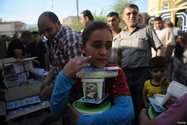
The Palestinian Ministry of National Economy revealed on Tuesday that during the month of July it seized 108 tonnes of spoiled goods produced in Jewish settlements.
According to a statement issued by the ministry's General Administration of Consumer Protection, the products that were confiscated by Consumer Protection units varied between food products, tobacco, beverages, crude oil, vegetable and animal oil, fats, waxes, chemical products, manufactured goods and transport equipment.
Most of these products are smuggled from Jewish settlements established in the West Bank into Palestinian villages, and from Palestinian villages into cities, out of the sight of customs police.
The amount of spoiled products smuggled into Palestinian territories and seized from the markets by the Palestinian authorities in 2014 alone reached 711 tonnes, most of which came from settlements established in the West Bank, according to the Palestinian Ministry of National Economy.
The confiscated products found by the Palestinian Authorities in the West Bank in the past month are worth 133.5 million shekels ($35.3 million), whereas the products found during the same period last year were worth $30 million.
Article 14 of the Palestinian constitution stipulates that whoever trades in products obtained from Israeli settlements could be sentenced to prison for a period of 2-5 years and fined at least 10,000 Jordanian dinars ($14,000).
Palestinian President Mahmoud Abbas and former Prime Minister Ismail Fayyad approved a law in 2010 banning the entry of any goods produced in Jewish settlements.
According to a statement issued by the ministry's General Administration of Consumer Protection, the products that were confiscated by Consumer Protection units varied between food products, tobacco, beverages, crude oil, vegetable and animal oil, fats, waxes, chemical products, manufactured goods and transport equipment.
Most of these products are smuggled from Jewish settlements established in the West Bank into Palestinian villages, and from Palestinian villages into cities, out of the sight of customs police.
The amount of spoiled products smuggled into Palestinian territories and seized from the markets by the Palestinian authorities in 2014 alone reached 711 tonnes, most of which came from settlements established in the West Bank, according to the Palestinian Ministry of National Economy.
The confiscated products found by the Palestinian Authorities in the West Bank in the past month are worth 133.5 million shekels ($35.3 million), whereas the products found during the same period last year were worth $30 million.
Article 14 of the Palestinian constitution stipulates that whoever trades in products obtained from Israeli settlements could be sentenced to prison for a period of 2-5 years and fined at least 10,000 Jordanian dinars ($14,000).
Palestinian President Mahmoud Abbas and former Prime Minister Ismail Fayyad approved a law in 2010 banning the entry of any goods produced in Jewish settlements.
4 aug 2015
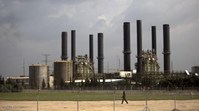
Vice president of the Energy Authority, Fathi Sheikh Khalil, confirmed the entry of the first truckloads of Qatari funded fuel into the blockaded Gaza Strip via Karem Abu Salem crossing for the sole power station in the Strip.
Khalil pointed out, in a statement to al-Rai agency, that technical crews of the power station are verifying the entered quantities of Qatari fuel.
For his part, the director general of the general administration of border crossings of the Palestinian Authority, Nathmi Muhanna, said four trucks of 190,000 liters reached the power station in Gaza.
He pointed out that pumping other quantities of Qatari fuel into Gaza will be resumed on Wednesday in coordination with the Israeli side.
In the same context, electricity service returned back to Rafah city partially after repairing one of the Egyptian electricity lines which was cut off suddenly on Monday. An official in the generation company affirmed that work is going on in repairing the other remaining lines.
Electricity lines which feed Rafah city from Egypt suddenly stopped with unreleased reasons on Monday.
Khalil pointed out, in a statement to al-Rai agency, that technical crews of the power station are verifying the entered quantities of Qatari fuel.
For his part, the director general of the general administration of border crossings of the Palestinian Authority, Nathmi Muhanna, said four trucks of 190,000 liters reached the power station in Gaza.
He pointed out that pumping other quantities of Qatari fuel into Gaza will be resumed on Wednesday in coordination with the Israeli side.
In the same context, electricity service returned back to Rafah city partially after repairing one of the Egyptian electricity lines which was cut off suddenly on Monday. An official in the generation company affirmed that work is going on in repairing the other remaining lines.
Electricity lines which feed Rafah city from Egypt suddenly stopped with unreleased reasons on Monday.
2 aug 2015
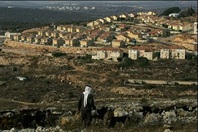
Israeli occupation forces Sunday dumped large amounts of soil in agricultural land belonging to Palestinian locals in the town of al-Khader to the south of Bethlehem, according to one of the land owners. The owner, Issa Salah, told WAFA that he was surprised when he arrived in his land to see large amounts of soil dumped in his land, along with other neighboring land belonging to other locals.
He said another land was razed for the benefit of building a cement wall for a nearby settlement.
Salah expressed fear that his land would be seized for the benefit of settlement expansion, due to the proximity of his land to the illegal settlement of Ifrat.
International law views the West Bank and East Jerusalem as 'occupied territories' and considers all Jewish settlement building on the land illegal.
According to United Nations Information System on the Question of Palestine (UNISPAL), “Israeli settlements are an obstacle to the creation of a future Palestinian state.”
It said that, “ Israel has committed itself under the Quartet road map to freeze all settlement activity, including the “natural growth” of settlements, a commitment never fully implemented.
“While there was a partial freeze of settlement activity for a period of 10 months in 2010, since then no further measures have been undertaken to meet that commitment.”
UNISPAL said that Estimates of the Israeli settler population in the Occupied Palestinian Territory vary between 500,000 and 650,000, living in some 150 settlements and 100 “outposts” in the West Bank, including East Jerusalem.
“The settler population (excluding that of East Jerusalem) has grown over the past decade at an average yearly rate of 5.3 per cent, compared with 1.8 per cent for the Israeli population as a whole.”
It stressed that, Israeli legal and administrative measures to furnish socioeconomic incentives, security, infrastructure and social services to citizens of Israel residing in the West Bank, including East Jerusalem, amount to the transfer by Israel of its population into the Occupied Palestinian Territory,” which is prohibited under international law.
“The continuation of that transfer and the maintenance and expansion of settlements have severe negative impacts on the right to self-determination of the Palestinian people.”
It said that, the right to self-determination is generally understood as having several components, including the right to have a demographic and territorial presence and the right to permanent sovereignty over natural resources.
“Those elements are adversely affected not only by the expansion of Israeli settlements but also by the mere presence of the settlements,” added UNISPAL.
He said another land was razed for the benefit of building a cement wall for a nearby settlement.
Salah expressed fear that his land would be seized for the benefit of settlement expansion, due to the proximity of his land to the illegal settlement of Ifrat.
International law views the West Bank and East Jerusalem as 'occupied territories' and considers all Jewish settlement building on the land illegal.
According to United Nations Information System on the Question of Palestine (UNISPAL), “Israeli settlements are an obstacle to the creation of a future Palestinian state.”
It said that, “ Israel has committed itself under the Quartet road map to freeze all settlement activity, including the “natural growth” of settlements, a commitment never fully implemented.
“While there was a partial freeze of settlement activity for a period of 10 months in 2010, since then no further measures have been undertaken to meet that commitment.”
UNISPAL said that Estimates of the Israeli settler population in the Occupied Palestinian Territory vary between 500,000 and 650,000, living in some 150 settlements and 100 “outposts” in the West Bank, including East Jerusalem.
“The settler population (excluding that of East Jerusalem) has grown over the past decade at an average yearly rate of 5.3 per cent, compared with 1.8 per cent for the Israeli population as a whole.”
It stressed that, Israeli legal and administrative measures to furnish socioeconomic incentives, security, infrastructure and social services to citizens of Israel residing in the West Bank, including East Jerusalem, amount to the transfer by Israel of its population into the Occupied Palestinian Territory,” which is prohibited under international law.
“The continuation of that transfer and the maintenance and expansion of settlements have severe negative impacts on the right to self-determination of the Palestinian people.”
It said that, the right to self-determination is generally understood as having several components, including the right to have a demographic and territorial presence and the right to permanent sovereignty over natural resources.
“Those elements are adversely affected not only by the expansion of Israeli settlements but also by the mere presence of the settlements,” added UNISPAL.
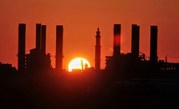
Energy and Natural Resources Authority in Gaza asked all competent authorities to work thoroughly for the entry of Qatari fuel into the blockaded Gaza Strip for the sake of running Gaza power station.
In a statement on Sunday, the Authority renewed its appeal to the Palestinian government to reduce taxes on the fuel price and to guarantee the continuation of fuel flow to the station.
It stated that the continuation of the current power distribution schedule by 8-hour running of electricity for 8-hour cut off depends on entering the Qatari fuel, for which efforts have been exerted for months. It also depends on the amendment of the mechanism of calculating the fuel prices and taxes.
In a statement on Sunday, the Authority renewed its appeal to the Palestinian government to reduce taxes on the fuel price and to guarantee the continuation of fuel flow to the station.
It stated that the continuation of the current power distribution schedule by 8-hour running of electricity for 8-hour cut off depends on entering the Qatari fuel, for which efforts have been exerted for months. It also depends on the amendment of the mechanism of calculating the fuel prices and taxes.
30 july 2015
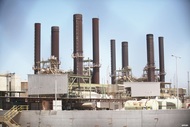
The head of the Palestinian Energy Authority said on Thursday that the Qatari fuel bound for the sole Gaza electricity plant had arrived at the Karem Abu-Salem Crossing, but Israel has delayed its entrance to the territory, the Safa news agency has reported.
"The fuel has arrived at the Israel side of the crossing," explained Omar Kitana, "but the Israeli authorities have put forward new conditions before it will be allowed into Gaza."
He said that a fuel tank at the crossing exploded two months ago and major repairs were made to its infrastructure and other issues. "But the Israelis have just demanded new measures at the last minute. Such measures were not demanded before."
To solve the problem, Kitana said that "intensive contacts" have been made with political parties, the Palestinian ministerial council and the civil affairs committee in order to allow the fuel to cross the border. "If the Israelis insist, though, we will be obliged to do what they say."
The fuel at the crossing is enough for one day only, he pointed out, noting that the energy authority has agreed with Egypt to transfer the Qatari donation on a daily basis directly from an Egyptian port to the plant. The storage tanks at the plant were destroyed by the Israelis during last year's war on Gaza.
Meanwhile, Kitana pointed out that delivery of the fuel bought from Israel for the electricity plant was resumed today after 5million shekels (around $1.25m) was transferred from Gaza to the Palestinian Authority in Ramallah. The delivery of fuel is dependent on such payments to the PA. "If this continues, we will be able to run a third electricity generation unit and we will have 18 hours of electricity every day," he added.
"The fuel has arrived at the Israel side of the crossing," explained Omar Kitana, "but the Israeli authorities have put forward new conditions before it will be allowed into Gaza."
He said that a fuel tank at the crossing exploded two months ago and major repairs were made to its infrastructure and other issues. "But the Israelis have just demanded new measures at the last minute. Such measures were not demanded before."
To solve the problem, Kitana said that "intensive contacts" have been made with political parties, the Palestinian ministerial council and the civil affairs committee in order to allow the fuel to cross the border. "If the Israelis insist, though, we will be obliged to do what they say."
The fuel at the crossing is enough for one day only, he pointed out, noting that the energy authority has agreed with Egypt to transfer the Qatari donation on a daily basis directly from an Egyptian port to the plant. The storage tanks at the plant were destroyed by the Israelis during last year's war on Gaza.
Meanwhile, Kitana pointed out that delivery of the fuel bought from Israel for the electricity plant was resumed today after 5million shekels (around $1.25m) was transferred from Gaza to the Palestinian Authority in Ramallah. The delivery of fuel is dependent on such payments to the PA. "If this continues, we will be able to run a third electricity generation unit and we will have 18 hours of electricity every day," he added.
29 july 2015
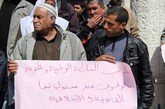
Dozens of Palestinian young men on Tuesday participated in a protest sit-in outside the electricity company in the Gaza Strip to demand an urgent solution to the power crisis.
The participants carried banners condemning the Palestinian government's failure to provide the Gaza power station with its fuel needs and demanding it to stop imposing heavy taxes on fuel shipments.
They also chanted slogans calling for a radical solution to the power crisis and warning of further deterioration of the humanitarian situation in Gaza if the problem was not addressed soon.
The participants carried banners condemning the Palestinian government's failure to provide the Gaza power station with its fuel needs and demanding it to stop imposing heavy taxes on fuel shipments.
They also chanted slogans calling for a radical solution to the power crisis and warning of further deterioration of the humanitarian situation in Gaza if the problem was not addressed soon.
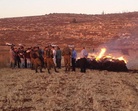
A number of armed Israeli extremists invaded, on Tuesday evening, Palestinian farmlands in Turmus Ayya town, north of the central West Bank city of Ramallah, and burnt piles of wheat that the Palestinians have harvested earlier.
Media sources said the extremists came from the Adi Ad illegal Israeli colony, built on privately own Palestinian lands.
The attack led to excessive losses, especially since the villagers rounded their harvest to prepare it for grinding and processing, before the fanatics invaded the area and burnt the harvest.
Israeli soldiers arrived in the area, and observed the devastating outcome of the attack.
There have been dozens of similar attacks against Palestinian farmlands, and orchards, in addition to physical assaults against the Palestinian property, while the Israeli army fails to even open a proper investigation.
Such attacks frequently led to burning and defacing several mosques and churches, in addition to graveyards, in different parts of occupied Palestine, including in Jerusalem.
Media sources said the extremists came from the Adi Ad illegal Israeli colony, built on privately own Palestinian lands.
The attack led to excessive losses, especially since the villagers rounded their harvest to prepare it for grinding and processing, before the fanatics invaded the area and burnt the harvest.
Israeli soldiers arrived in the area, and observed the devastating outcome of the attack.
There have been dozens of similar attacks against Palestinian farmlands, and orchards, in addition to physical assaults against the Palestinian property, while the Israeli army fails to even open a proper investigation.
Such attacks frequently led to burning and defacing several mosques and churches, in addition to graveyards, in different parts of occupied Palestine, including in Jerusalem.
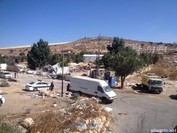
Israeli soldiers invaded the Beit Hanina neighborhood, north of occupied Jerusalem, and demolished a print shop, a carpentry workshop, a wedding hall and a warehouse, all located on an area measuring six and a half Dunams (1.6 Acres.)
The Wadi Hilweh Information Center in Silwan has reported that the demolitions took place in Wad ad-Dam area, in Beit Hanina.
The owner of the buildings, Akram Abu Shalbak, said the structures were built in 2014; some of them had tin roofs, and the others were built with stone roofs.
Abu Shalbak added that all of his buildings were officially licensed, and that he concluded all documents and paperwork over two months ago.
He also stated that the demolished wedding hall was 500 square meters, and included five ballrooms, six bathrooms and other facilities.
The demolitions took place after dozens of soldiers, including undercover units, surrounded the Wad ad-Dam area, beginning in the early morning hours, and then invaded the neighborhood.
The Wadi Hilweh Information Center in Silwan has reported that the demolitions took place in Wad ad-Dam area, in Beit Hanina.
The owner of the buildings, Akram Abu Shalbak, said the structures were built in 2014; some of them had tin roofs, and the others were built with stone roofs.
Abu Shalbak added that all of his buildings were officially licensed, and that he concluded all documents and paperwork over two months ago.
He also stated that the demolished wedding hall was 500 square meters, and included five ballrooms, six bathrooms and other facilities.
The demolitions took place after dozens of soldiers, including undercover units, surrounded the Wad ad-Dam area, beginning in the early morning hours, and then invaded the neighborhood.
27 july 2015
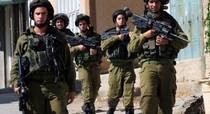
Israeli soldiers invaded, earlier on Monday, Toura town in the northern West Bank district of Jenin, and kidnapped two Palestinians.
The Palestinian Prisoners Society (PPS) has reported that the soldiers invaded the home of a young man, identified as Fadi Omar Qabaha, searched and ransacked the property, and kidnapped him before moving him to an unknown destination.
The PPS added that the soldiers also stopped a young man, identified as Omran Bassem Qabaha, on the Salem military roadblock, west of Jenin, and kidnapped him.
In related news, soldiers invaded several Palestinian stores in Hizma town, northeast of Hebron, and forced them to close. The army claimed a number of Palestinians hurled stones on their vehicles.
The Palestinian Prisoners Society (PPS) has reported that the soldiers invaded the home of a young man, identified as Fadi Omar Qabaha, searched and ransacked the property, and kidnapped him before moving him to an unknown destination.
The PPS added that the soldiers also stopped a young man, identified as Omran Bassem Qabaha, on the Salem military roadblock, west of Jenin, and kidnapped him.
In related news, soldiers invaded several Palestinian stores in Hizma town, northeast of Hebron, and forced them to close. The army claimed a number of Palestinians hurled stones on their vehicles.

The Independent Commission for Human Rights warned, this Saturday, of the aggravated humanitarian situation in Gaza, due to continued electricity outage, calling on defacto Palestinian president Mahmoud Abbas for immediate intervention in ending the crisis.
Deputy Commissioner-General of the Commission Issam Younis stated in a press conference, Saturday, that the humanitarian conditions in Gaza are worsening more and more, as a result of the continued electricity cuts and the reduction of electricity hours.
He stressed, according to Al Ray, that the situations are intolerable, as the ongoing crisis has grave impacts on all Gazans' walks of life."Politicizing the electricity crisis affected the life of Gazans, calling on all officials to hold their responsibilities," he added.
Coordinator of Public Relations and Media in the commission, Bahgat al-Helo, expressed grave concern over the suffering of the people of Gaza.
The official stance of Palestinian officials in the West Bank and Gaza, regarding the crisis, has affected the economic and social aspects of life in the region.
The commission shed the light on Gazans' collective plight, explaining that the people have been suffering under the tightening blockade, collective punishments, restricting the people movement, the lack of goods, services, basic needs, medical supplies, fuel and electricity for nine years.
It added that the electricity blackouts are aggravated in the summer, especially during the heat wave, depriving the people of drinking water. It also affected kidney patients and the premature. In addition, the Israeli policy which deprived the Gaza Strip of adequate and constant electricity constitute, according to the commission, a flagrant violation of international humanitarian law.
It stressed that this, in turn, required the signatory state parties to the Fourth Geneva Convention direct immediate intervention in putting pressure on the occupation to stop its practices, and to meet its obligations regarding the rights of the civilian population in Gaza.
ICHR calls for an immediate agreement to solve the electricity crisis, and save the lives of people.
Deputy Commissioner-General of the Commission Issam Younis stated in a press conference, Saturday, that the humanitarian conditions in Gaza are worsening more and more, as a result of the continued electricity cuts and the reduction of electricity hours.
He stressed, according to Al Ray, that the situations are intolerable, as the ongoing crisis has grave impacts on all Gazans' walks of life."Politicizing the electricity crisis affected the life of Gazans, calling on all officials to hold their responsibilities," he added.
Coordinator of Public Relations and Media in the commission, Bahgat al-Helo, expressed grave concern over the suffering of the people of Gaza.
The official stance of Palestinian officials in the West Bank and Gaza, regarding the crisis, has affected the economic and social aspects of life in the region.
The commission shed the light on Gazans' collective plight, explaining that the people have been suffering under the tightening blockade, collective punishments, restricting the people movement, the lack of goods, services, basic needs, medical supplies, fuel and electricity for nine years.
It added that the electricity blackouts are aggravated in the summer, especially during the heat wave, depriving the people of drinking water. It also affected kidney patients and the premature. In addition, the Israeli policy which deprived the Gaza Strip of adequate and constant electricity constitute, according to the commission, a flagrant violation of international humanitarian law.
It stressed that this, in turn, required the signatory state parties to the Fourth Geneva Convention direct immediate intervention in putting pressure on the occupation to stop its practices, and to meet its obligations regarding the rights of the civilian population in Gaza.
ICHR calls for an immediate agreement to solve the electricity crisis, and save the lives of people.
24 july 2015
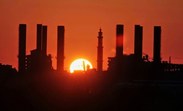
The foundation responsible on water and sewage in Gaza Strip warned of a humanitarian catastrophe due to the shutdown of the sole power station in the blockaded enclave for three days in a row.
The Coastal Municipalities Water Utility (CMWU) said, in a statement on Thursday, “a humanitarian and environmental catastrophe threatens the people of Gaza (1.8 million) due to failure to run water and sewage facilities.
The statement pointed out that the power crisis coincides with the summer season in which water is consumed in large quantities.
It stated that the power crisis caused a water cut off over wide areas in the blockaded enclave in addition to the shutdown of sewage pumps leading to pollution.
Sources of the environment authority in Gaza said 190 water wells, 57 pumps, and 4 sewage treatment plants have been working partially due to power cut off.
CMWU asked the international humanitarian institutions to intervene to solve the crisis and stop a very likely humanitarian and environmental catastrophe in the Strip.
The Coastal Municipalities Water Utility (CMWU) said, in a statement on Thursday, “a humanitarian and environmental catastrophe threatens the people of Gaza (1.8 million) due to failure to run water and sewage facilities.
The statement pointed out that the power crisis coincides with the summer season in which water is consumed in large quantities.
It stated that the power crisis caused a water cut off over wide areas in the blockaded enclave in addition to the shutdown of sewage pumps leading to pollution.
Sources of the environment authority in Gaza said 190 water wells, 57 pumps, and 4 sewage treatment plants have been working partially due to power cut off.
CMWU asked the international humanitarian institutions to intervene to solve the crisis and stop a very likely humanitarian and environmental catastrophe in the Strip.
20 july 2015
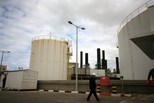
The electricity generation in the Gaza power plant will stop as of Monday evening after the mechanism for supplying the facility with fuel have come to a halt, the energy and natural resources authority has warned.
According to the power authority, this mechanism lasted for a few months and included a deduction for Israel's blue tax from the price of fuel shipped to the power plant in Gaza.
The power authority also said it had managed to secure loans from private companies and banks to fulfill its obligations within this mechanism for more than four months and keep the plant running.
It added that the persistence of the Ramallah-based ministry in imposing taxes on the price of the fuel used by the Gaza power plant also contributed to the electricity crisis.
It called on the Palestinian government to cancel all taxes and provide a new mechanism to supply the Gaza power plant with fuel at low prices.
Israel Bars Repair of Gaza Electricity Grids, Plant Again Threatened with Closure
Israeli authorities have prevented Israeli power firm from repairing electricity grids supplying Gaza Strip, Palestinian officials said on Monday.
A technical error in the Israeli side cut off two main power grids supplying electricity to the Gaza Strip over the weekend. The down lines provide 25 percent or 30 megawatts, of the electricity that the Israeli occupation sells to the Strip.
Power grid No. 8, which provides electricity to central Gaza and parts of Khan Younis, shut down three days ago, and Al-Qubba grid, which provides electricity to the Gaza City, shut down on Sunday, according to Days of Palestine.
Officials of the Gaza Electricity Distribution Company said the company is attempting to cooperate with the Palestinian Power Authority to repair the broken grids, but said the Israeli occupation is obstructing their efforts.
Meanwhile, the occupation also is preventing the Israeli Electricity Corporation from fixing the grids on the grounds of security concerns.
Gaza currently receives electricity from the Israeli occupation, Egypt, and a power station inside Gaza.
However, these supply lines fall far short of the Gazan population’s needs. While the three suppliers provide 230 MW of electricity, the UN estimates that this meets only half of Gaza’s needs.
The Israeli occupation and Egypt have maintained a severe blockade of the Gaza Strip for the last eight years that has crippled the coastal enclave’s economy by limiting imports, exports and movement of people.
Although the power plant inside Gaza has a potential output of 120 MW, it has been unable to produce that much due to Israeli restrictions on fuel imports and high taxes imposed by the Palestinian Authority based in Ramallah.
Therefore, the Gaza plant generally produces around 60 MW, 50 percent of its potential.
Last summer the plant was targeted during the 51-day Israeli offensive on Gaza, completely knocking it out of commission. The Gaza power authority said at the time that the damages from the attack could take up to a year to fix completely.
Gaza suffers 12 hours of power outages each day. Many individual homes have their own generators, and households can purchase extremely expensive fuel that comes into Gaza for private consumption.
Plant threatened with closure
The plant will stop running Monday evening as it is unable to cover taxes imposed by the national unity government, Gaza's energy authority said, according to Ma'an News Agency.
The unity government waved the tax in a show of good will in the four months to the end of Ramadan, but the Gazan energy authority said in a statement Monday that since the tax has been reinstated it can no longer afford to keep the plant running.
The energy authority added that it had only been able to cover the cost of maintaining the plant during the holy Muslim month of Ramadan and the Eid holiday by borrowing from local companies and taking loans from banks.
According to the power authority, this mechanism lasted for a few months and included a deduction for Israel's blue tax from the price of fuel shipped to the power plant in Gaza.
The power authority also said it had managed to secure loans from private companies and banks to fulfill its obligations within this mechanism for more than four months and keep the plant running.
It added that the persistence of the Ramallah-based ministry in imposing taxes on the price of the fuel used by the Gaza power plant also contributed to the electricity crisis.
It called on the Palestinian government to cancel all taxes and provide a new mechanism to supply the Gaza power plant with fuel at low prices.
Israel Bars Repair of Gaza Electricity Grids, Plant Again Threatened with Closure
Israeli authorities have prevented Israeli power firm from repairing electricity grids supplying Gaza Strip, Palestinian officials said on Monday.
A technical error in the Israeli side cut off two main power grids supplying electricity to the Gaza Strip over the weekend. The down lines provide 25 percent or 30 megawatts, of the electricity that the Israeli occupation sells to the Strip.
Power grid No. 8, which provides electricity to central Gaza and parts of Khan Younis, shut down three days ago, and Al-Qubba grid, which provides electricity to the Gaza City, shut down on Sunday, according to Days of Palestine.
Officials of the Gaza Electricity Distribution Company said the company is attempting to cooperate with the Palestinian Power Authority to repair the broken grids, but said the Israeli occupation is obstructing their efforts.
Meanwhile, the occupation also is preventing the Israeli Electricity Corporation from fixing the grids on the grounds of security concerns.
Gaza currently receives electricity from the Israeli occupation, Egypt, and a power station inside Gaza.
However, these supply lines fall far short of the Gazan population’s needs. While the three suppliers provide 230 MW of electricity, the UN estimates that this meets only half of Gaza’s needs.
The Israeli occupation and Egypt have maintained a severe blockade of the Gaza Strip for the last eight years that has crippled the coastal enclave’s economy by limiting imports, exports and movement of people.
Although the power plant inside Gaza has a potential output of 120 MW, it has been unable to produce that much due to Israeli restrictions on fuel imports and high taxes imposed by the Palestinian Authority based in Ramallah.
Therefore, the Gaza plant generally produces around 60 MW, 50 percent of its potential.
Last summer the plant was targeted during the 51-day Israeli offensive on Gaza, completely knocking it out of commission. The Gaza power authority said at the time that the damages from the attack could take up to a year to fix completely.
Gaza suffers 12 hours of power outages each day. Many individual homes have their own generators, and households can purchase extremely expensive fuel that comes into Gaza for private consumption.
Plant threatened with closure
The plant will stop running Monday evening as it is unable to cover taxes imposed by the national unity government, Gaza's energy authority said, according to Ma'an News Agency.
The unity government waved the tax in a show of good will in the four months to the end of Ramadan, but the Gazan energy authority said in a statement Monday that since the tax has been reinstated it can no longer afford to keep the plant running.
The energy authority added that it had only been able to cover the cost of maintaining the plant during the holy Muslim month of Ramadan and the Eid holiday by borrowing from local companies and taking loans from banks.
